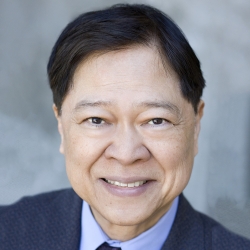
Gerardo "Buddy" Ungson, Ph.D.
Y.F. Chang Endowed Chair and Professor of International Business
International Business Professor Gerardo "Buddy" Ungson is deeply inspired by global experiences in both research and teaching. His formative years in the Philippines were a catalyst for his focus on international business, and his position as Y.F. Chang Endowed Chair at the Lam Family College of Business (LFCoB) has furthered Ungson’s deep exploration of his field as it relates to development across the world.
As an Endowed Chair, Ungson addresses four self-selected goals: sustaining an active research agenda; undertaking key roles in service; enhancing interdisciplinary research by involving other departments; and developing a center for research, learning, and engagement. “I still have some unrealized goals that I will achieve in the not-too-distant future,” he says. “I am deeply appreciative of the support provided by Chairman Chang.”
Ungson describes three key research areas that have defined his tenure at SF State, all addressing principal challenges faced in emerging and developing economies. His first area of focus is on strategies in emerging markets, which is embodied by an ongoing research collaboration with Sam Park, former President of Samsung China’s Economic Research Institute and Managing Director of Skolkovo-EY Institute for Emerging Market Studies, as well as a partnership with Ernst & Young. This research led to the development of Ungson’s award-winning book, Rough Diamonds: The Four Traits of Successful Breakout Firms in BRIC Countries, which received the 2013 Best Book on Globalization award from the Strategy + Business Journal.
Ungson also conducts research on poverty alleviation. He describes an “epiphany” in a meeting with development economist Sixto K. Roxas, which shifted his attention from the strategies of multinational corporations to alleviating and eradicating poverty in developing countries, challenging him to explore economic classics, philosophy, sociology, anthropology, and even New Age publications in order to effectively engage in developing economies.
Additionally, Ungson has partnered with Decision Sciences Professor Sada Soorapanth to examine the vulnerabilities caused by viruses in developing nations. During the COVID-19 pandemic, Ungson says the team redirected their study to the resilience of healthcare systems in Southeast Asia, adopting information technology as an anchor for evaluating the readiness of countries to respond.
He is now working on a fourth stream of research – digitalization in emerging markets – exploring the confluence of digital applications often referred to as the Fourth Industrial Revolution. “I am interested in how digitalization has become an imperative for rethinking conventional business theories about growth, development, and transformation not only in advanced economies, but in emerging and developing economies as well,” says Ungson.
Because global challenges must be addressed from a holistic perspective, Ungson sees an opportunity for students to gain a global perspective by studying International Business. “The field of international business is shifting from business enterprises operating overseas to globalizing and localizing forces that impact institutions and society,” he noted. Whether through double majors, minors, or electives, Ungson sees a huge benefit for students in interdisciplinary orientation. “Students espousing an interdisciplinary orientation such as international business, entrepreneurship, or even environmental sustainability are expected to also demonstrate employable disciplinary skills, which is the correct pathway,” he says. “Double majors can provide a winning ticket.” These complementary skills equip students to work effectively in an increasingly conscious global business landscape.
“As much as I value research, I take pride in being an educator,” Ungson says. He aspires to create a transnational face-to-face pedagogical platform that will use technology to engage students and practitioners in real time, allowing all to gain a global perspective on shared issues and lessons. For Ungson, the disruption of the pandemic has enhanced the need for a tool that facilitates academic connectedness across nations.
Social entrepreneurship, or ventures focused on improving a facet of societal welfare, is a concept Ungson views as good currency in today’s business world. As for how the value of social entrepreneurship is embodied by the LFCoB community, Ungson identifies several alumni who are pioneers in this era of social causes and sustainability. Among them is Sean Ansett (MBA, ‘98), director of At Stakes, a worldwide social entrepreneurial firm, where he studies the plight of workers in the world apparel industry who have been adversely affected by global supply chains. Another such alum is Paloma Lopez (MBA, ‘98) examines the deficiencies of the current food supply chain and aspires to bring about reform through her start-up, Future Fit Foods, which is built on an adaptation of a circular model that compels environmental sustainability. Included in this alumni group of social entrepreneurs is Greggory Cates (MBA, ‘06), who is working towards an organic civilization by developing innovative interventions, including an anti-malaria sensor system in South Africa.
In addition, Ungson recognizes several fellow faculty members for their noteworthy work addressing societal welfare issues. To name a few, Information Systems Professor Sameer Verma leads the “one laptop per child” initiative in developing countries, Professor of Labor and Employment Studies John Logan is at the forefront of worker rights and collective bargaining issues in the Bay Area, and Management Professor Geoff Desa studies the phenomenon of social entrepreneurship and sustainable ventures. Ungson notes there is significant research activity underway across the college examining healthcare issues, the student debt crisis, the emerging gig economy, societal engagement, and other issues that straddle social justice and the business world.
“For all too long, business education has not attended as much to poverty in emerging and developing economies,” Ungson reflects. “For me, ‘social justice’ means inclusion and engagement in ways that improve the welfare of all, but particularly for the poor and those unprivileged in society.”
Visit the International Business Department page to learn more about our programs and the variety of courses we offer in this field.